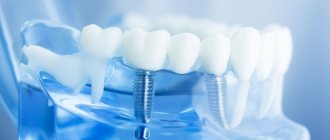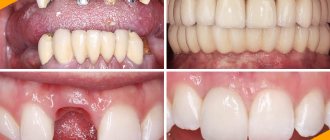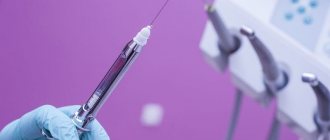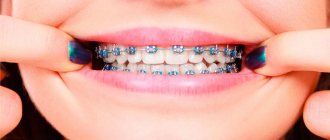Publication date: 05/26/2021
Patients usually prepare for dental implantation in advance, weighing the pros and cons, trying to choose a clinic and specialist in advance. But you need to choose an implantation system; difficulties arise. The variety of types of implants, manufacturers and price range makes you seriously think about what dental implants are best to choose?
The doctor will be able to say exactly which implantation system will be optimal in a given clinical case after examination and comprehensive diagnostics. After all, dental implants have different shapes, designs, surfaces, and are used for different indications and treatment protocols.
Moscow dentists use implants from different manufacturers. There are more than a hundred companies in the world producing implant systems and suprastructures for them. Based on price, they are divided into 3 main classes - premium, medium and economy. The choice is based on the reliability of the designs, price, survival rate, manufacturer’s and clinic’s warranty.
Features of the Bicon implant
Any implant system has certain features and differences. The characteristic features that distinguish Bicon implants from similar products include the following:
- The length of Bicon titanium rods is no more than 8 millimeters, while products from other manufacturers are twice as long;
- the area of the implants is approximately three times larger in comparison with analogues due to the increased width of the rod, which ensures their correspondingly higher resistance to external loads and their reliable fastening in the jaw with a short screw length;
- good survival rate is ensured by excellent biocompatibility with bone tissue and high quality titanium alloy;
- due to the small size of Baikon implants, they minimize the risk of damage to bone tissue and gums;
- fixing the system is quite simple; when installing them, there is no need to use special tools or cut tissue;
- There are no fasteners or screws in the mouth, which makes oral care easier and improves hygiene.
Due to their small size, Bicon systems, in comparison with analogues, are distinguished by much higher reliability, stability and stability.
Cost of treatment
Many factors influence the price. How much it will cost a patient to install implants depends on the preparatory work, the current condition of the oral cavity, and the presence of chronic diseases. The total price is also affected by the range of products and medications used. It is also important what pricing policy the chosen dental clinic follows, since the difference in cost can reach several times. Average prices for prosthetics are as follows:
- internal diameter 2 mm - 30,000 rubles;
- ext. d. 2.5 mm - 27,000 rub.;
- ext. d. 3 mm - 20,000 rub.
The price is for 1 element. Thus, the patient can independently calculate the approximate amount required for prosthetics, based on how many products of a particular diameter will be installed.
Types (models) of Baikon implants
Depending on the diameter, length and connection with the Bicon abutment, implants, the price of which is quite affordable, are divided into three model groups:
- Short series. Rod length 8-11 mm, internal connection 3.0 mm, diameter 4.5-6.0 mm. Such products are the smallest in length. They are designed in the form of a cone-shaped connection, completely immersed in the bone tissue, without touching the alveolar nerves. Prevents bacteria from entering the tooth socket;
- Max 2.5 series. Length 8-11 mm, connection to abutment 2.5 mm, diameter 4-4.5 mm. The model is designed for implantation into the front part of the jaw, but installation in other areas is not excluded. The design has a cone shape. There is the possibility of re-implantation if necessary;
- Narrow series. 8-11 mm – length, 2.0 mm – internal connection, 3-4.5 mm – diameter. Designed for installation on the lower jaw in the front part with a small space between the teeth.
Installation sequence
First, the dentist selects suitable implants after examining the oral cavity. Indications and contraindications are studied so that possible consequences can be anticipated. Sometimes it is necessary to manufacture individual diagnostic implants. As an additional procedure, some are prescribed a computed tomography scan.
When the necessary information is collected, a template is made. Then the patient is prepared for the procedure: instructions are given, local or general anesthesia is provided. Before installing the implant, the site for it is processed. The implantation itself takes no more than 1.5 hours. Since anesthesia is used, the patient does not feel pain during the operation. Unpleasant sensations are possible only during amputation of a tooth or root, if it precedes prosthetics.
After installing the implant, the specialist performs a fixed restoration. A temporary abutment is kept in your mouth while it takes to heal. After the specified period, if there are no problems, it is removed and a permanent one is installed in its place.
Depending on the type of anesthesia used, the postoperative period lasts from 24 to 72 hours. Some patients are particularly intolerant of pain, so special means are selected for them to protect them from pain for several days after implantation.
Advantages of Baikon implants
The main advantage of Bicon brand implants is that there is no need to build up bone tissue when installing them. The titanium root takes root in an extremely short time and remains securely fixed.
The list of advantages of Baikon systems is quite impressive. Among the main ones note:
- compared to conventional dentures, installation of Bicon rods takes much less time;
- The titanium root does not cause any complications after implantation;
- artificial teeth are reliable in operation and visually aesthetically attractive;
- the prosthesis is fixed immediately after its installation and does not cause any discomfort to the patient;
- during the implantation process, the risks of damage to soft tissues are minimal;
- installation can be carried out using a two-stage or one-stage method.
Another advantage that sets Baikon implants apart from analogues is the price, which is much lower than prostheses of other brands. The quality of the implants is highly appreciated by doctors and consumers all over the world. Numerous reviews are direct confirmation of their reliability and impeccability.
Differences and advantages
The size of the denture is only 8 mm, which guarantees excellent survival even with a small alveolar. The implant has an increased area compared to products from other companies. This provides good stability and the ability to withstand high loads. Due to the fact that the dentures are generally small, bone and gum tissue are minimally injured during prosthetics.
During the installation of a denture, high-quality integration of the rod with the bone is achieved. To implant Beacons, you do not need to make incisions in the tissue: implantation is carried out using a puncture. The risk of rejection is quite low, since the prosthesis shaft is made of high-quality titanium alloy. Oral hygiene after prosthetics does not cause difficulties due to the fact that the design does not have screw fastenings.
It may seem that due to the simplicity of the design, Bicon implants are not functional enough, but this is not the case. Small products are physiological, easy to install, durable and reliable.
Advantages of the brand that dentists highlight:
- the ability to perform prosthetics in a short time;
- implantation without sinus lifting and bone tissue augmentation;
- short recovery period;
- no complications;
- modern design, functionality and durability of prostheses;
- the possibility of installing a prosthesis immediately after implantation of the structure;
- minimal damage to bone and gum tissue;
- the possibility of prosthetics in 1 or 2 stages, including in atrophied or injured tissue, after a previous illness and with periodontal disease;
- ease of implantation immediately after removal of a diseased tooth;
- no gaps or fastenings where germs can get in;
- safety and absolute biocompatibility of implants;
- lifetime warranty.
If there is not enough space in the dentition to install the prosthesis on the base, you can cover the surface of the product with a material that matches the color and texture of the tooth enamel.
Rehabilitation after surgery
The first thing that is necessary after implantation is to follow the doctor’s recommendations and maintain oral hygiene. Immediately after surgery, the patient may experience moderate pain, but this is completely natural. Usually after three days the pain disappears.
In the postoperative period, it is very important to monitor the strength of the fastenings, and if even slight mobility is observed, then you should immediately consult a doctor for more reliable fixation and elimination of defects.
Patient reviews
The difference between Beacon implants and others is that they are driven in with hammers rather than screwed. That's what the doctor told me. On the one hand, this is good, because there is no screw fastening, which can become loose over time. On the other hand, I had some fears: suddenly something would go wrong. After the tooth was removed, I was immediately fitted with a prosthesis and a temporary abutment, and when everything had healed, a permanent prosthesis was secured. This was a few months ago. The tooth functions normally, there is no feeling that there is something foreign in the mouth.
Antonina, Blagodarny
I recommend this brand of dentures to anyone who decides to get their teeth done. I liked it because at an average price the quality is very decent. 3 years after prosthetics, the implants stand like a glove, not a single tooth has become loose. I'm glad that the color of the coating remained the same as it was originally. There is no discomfort when chewing and you can eat absolutely any food, including hard foods. Of course, I wouldn’t recommend cracking nuts or uncorking bottles - you need to take care of your teeth, whether false or your own.
Sergey, Gavrilov-Yam
When the time came to think about installing dentures, I hesitated for a long time.
It seemed that I could not live with artificial teeth. I went for a consultation with my dentist several times - he is one of those people about whom they say “a doctor from God.” So, he said that it was best to buy Baikon implants, although his wife (on the advice of a friend) insisted on the Snukon brand. I followed the specialist’s advice and did not regret my choice. It’s been 2 years now, no problems yet, and the artificial teeth feel no different from their own. Ivan, Nizhnevartovsk
The cost of installing implants on a turnkey basis
Dental implantation on a “turnkey” basis is an operation with a fixed cost, which initially includes the entire range of procedures and materials that will be required during the treatment period. This protects the patient from additional costs and payments. The final price may be affected by the number of teeth to be restored, the need for additional procedures - bone grafting, sinus lifting, treatment and tooth extraction, etc. The case payment system allows the patient to understand exactly what he is paying for and what is included in the list of services provided.
What can you encounter on the lower jaw?
Quite often the mandibular canal is divided and has branches located quite close to the surface. Installation of a long implant threatens damage to several branches of the canal, loss of sensitivity and serious problems for the patient.
The use of short implants avoids such injuries.
It is important to understand that in aesthetically important areas (front teeth), short implants do not always give the expected result.
It’s difficult to call this look aesthetic.
Why you can’t install implants from different manufacturers
In some dentistry, in order to reduce the cost of treatment, the patient is offered to combine implant systems according to the type - “one is more expensive, the other is cheaper.” For example, install 2 Straumann and 2 Ankylos implants. This is wrong and dangerous. When installing artificial roots made of different materials, impurity metals may begin to conflict, which is fraught with complications:
- development of allergies;
- the occurrence of galvanic syndrome;
- peri-implantitis with rejection of the artificial root.
Installation of suprastructures and prostheses with components made of other metal alloys aggravates the situation.
Since dental implantation is an expensive method of prosthetics, it is necessary to eliminate the slightest risk of a “battery effect” or an allergy to the installed system. Such problems can be avoided by installing implants and suprastructures for them (abutments, gum formers) from the same manufacturer, and using prosthetic structures made of bioinert material (zirconium, ceramics, precious metals) that are resistant to oxidation.










